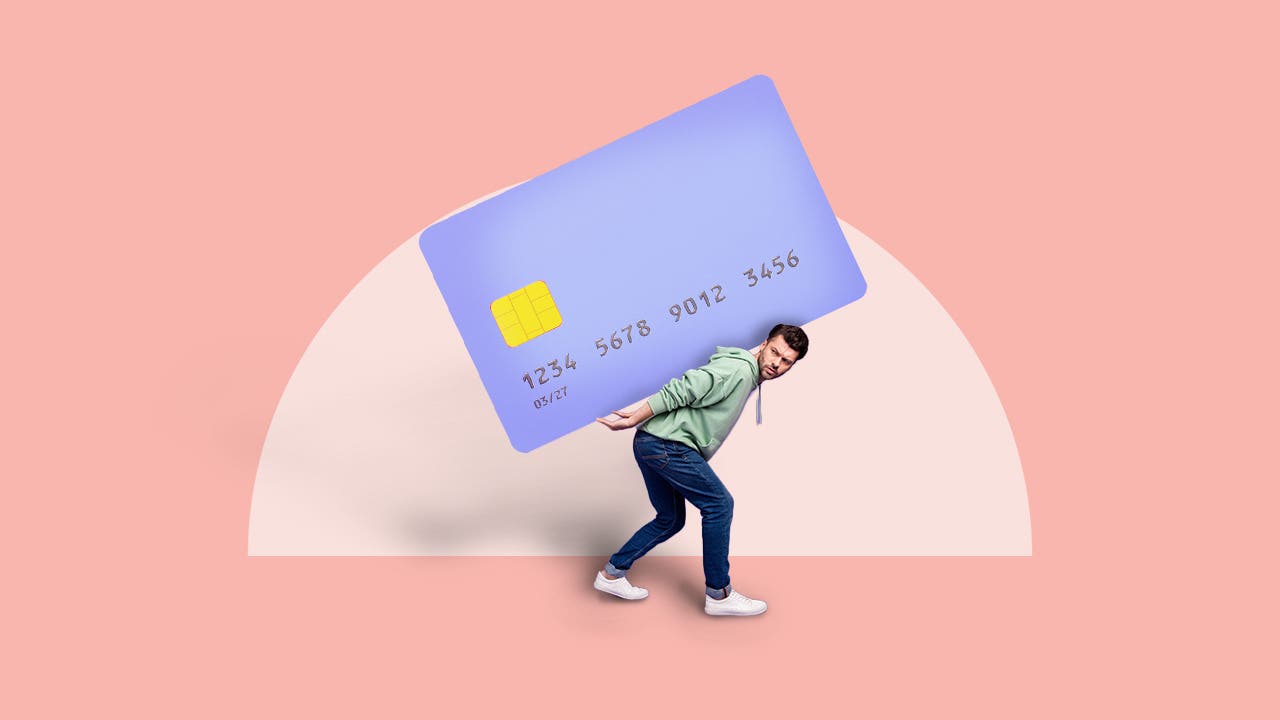Bankrate’s 2026 Credit Card Debt Report




Here’s the kicker about credit card debt — as soon as it starts rolling down the hill, interest charges mean it gains momentum and size. Unfortunately, it’s a slippery slope that many credit cardholders find themselves on… and increasingly stuck there long-term.
Credit card interest rates are some of the highest borrowing costs out there, currently averaging above 19%. When you carry a card balance, not only are you taking money from your future self, but you’re piling interest on top of interest.
The implications of credit card debt are far-reaching, from pausing major life decisions to feeling like you’ll never pay it off. But with the right tools, it’s possible to tackle your debt before it takes over.
For millions of American households, credit card debt represents their highest-cost debt by a wide margin— Ted Rossman, Bankrate Senior Industry Analyst
Bankrate’s key insights on credit card debt
Sixty-one percent of Americans with card debt have been in debt for at least a year — up from 53% in late 2024.
Source: Bankrate’s 2026 Credit Card Debt Survey
Forty-seven percent of credit cardholders report having a credit card balance. About 1 in 5 (22%) debtors don’t think they’ll ever pay it off.
Source: Bankrate’s 2026 Credit Card Debt Survey
Among credit card debtors, 41% say their debt comes primarily from emergency/unexpected expense(s), including medical bills (12%), car repairs (8%), home repairs (8%) and other emergency or unexpected expenses (13%). Thirty-three percent, up from 28% in 2024 and 26% in 2023, cite day-to-day expenses such as groceries, childcare and utilities.
Source: Bankrate’s 2026 Credit Card Debt Survey

Bankrate Data Center
Since 1976, Bankrate has been the go-to source for personal finance data, publishing average rates on the most popular financial products and tracking the experience of consumers nationwide.
See moreLong-term credit card debt is on the rise
About 3 in 5 cardholders (61%) with credit card balances have been in debt for at least a year — that’s up from 53% in late 2024. This includes 31% of those who have been in debt for at least three years and 21% who have been in debt for at least five years.
Even if you’re making minimum payments on your balance, that may not cut it.
“Minimum payments could keep you in debt for decades and cost you thousands of dollars in interest,” Rossman explains.
For example, the average credit card balance is $6,523, according to TransUnion. If you only make minimum payments at 19% APR, you could be in debt for 170 months and pay $6,491 in interest.
Nearly half of American credit cardholders still carry debt, mainly due to emergency costs
Lana Linge, 29, has been through three cycles of credit card debt during the last decade. Most recently, she was in $40,000 of credit card debt spread across six cards.
Linge admits, in some ways, she was living beyond her means and spending to cope emotionally. But she was also laid off the year prior, and was still on the hook for mortgage payments, an emergency vet bill and everyday expenses like gas and groceries.
Inflation had increased… and everything cost more. I didn’t adjust my cost of living or lifestyle at all.— Lana Linge, Host of Your Inner Spark Podcast
Linge is not alone — 47% of American credit cardholders carry a balance as of December 2025. That’s basically flat since November 2024 (when it was 48%), but up from 39% in December 2021.
Linge never missed a credit card minimum payment. But eventually, she could no longer pay her bills. She cut up her credit cards and made the decision to file for Chapter 7 bankruptcy.
“When you view yourself as a pretty responsible individual, it can be very difficult to determine the fact that you have a part of your life that you have not been responsible in,” Linge says. She also shares that she grew up in a financially unstable household. At one point, they lost their home to foreclosure.
Moving forward, Linge says she aspires to not end up in this situation again — by checking her finances daily and changing her mindset around money.
Americans have trouble talking or even thinking about credit card debt. We need to take the stigma out of it. If you have credit card debt, you have plenty of company, and the causes are usually practical. But you can’t hide from it, especially since credit card balances and rates are near record highs.
— Ted Rossman Bankrate Senior Industry Analyst
About half of American cardholders carry credit card debt, but Gen Xers and millennials lead the pack
The number of American cardholders with credit card debt — 47%— has remained nearly flat since this time last year (48%).
Among credit cardholders, more than half of Gen Xers (ages 46-61; 53%) and millennials (ages 30-45; 53%), as well as more than 2 in 5 boomers (ages 62-80; 43%) and Gen Zers (ages 18-29; 40%) carry a balance from month to month.
Some credit card debtors feel doomed
About 1 in 5 (22%) credit card debtors don’t believe they’ll ever get out of credit card debt. And this isn’t confined to older generations. Twenty-three percent each of millennials and boomers and 22% of Gen Xers with credit card debt believe they will always have credit card debt, compared with 18% of Gen Zers.
Fewer than half of debtors (48%) have a plan to pay off their credit card debt.
More than a quarter of debtors (27%) feel less confident in their ability to get out of credit card debt now than they did last year.
And almost 1 in 5 debtors worry they might not be able to make their minimum payments at some point in the next six months (19%).
“The fact that most credit card debtors don’t have a plan to get out of debt is alarming but not surprising,” Rossman says.
In general, money is a common stressor for Americans’ mental health, with 43% citing it as something which has a negative impact on their mental health, according to Bankrate’s 2025 Money and Mental Health Survey. Current events follow closely at 38%. So today’s economic indicators might explain why Americans are hemming and hawing about their future debt repayment.
Emergency and day-to-day expenses are the most common reasons for credit card debt
Among credit card debtors, more than 2 in 5 (41%) say the primary cause was an emergency expense.
That includes medical bills (12%), car repairs (8%), home repairs (8%) and other emergency or unexpected expenses (13%).
About 1 in 3 (33%) cited day-to-day expenses such as groceries, childcare and utilities as the primary cause. Only 10% of credit card debtors cited retail purchases such as clothing and electronics as the primary cause of their credit card debt, and 7% said vacation and/or entertainment expenses.
Credit card debt puts people’s lives on pause
Nearly 2 in 3 U.S. credit cardholders with debt (64%) say they have delayed or avoided financial decisions because of their credit card debt, according to Bankrate’s 2025 Dealing With Debt Survey.
Saving for an emergency (34%), investing (23%) and buying a vehicle (21%) are the most likely to be set back.
Credit card debtors also say they’ve put off helping family and/or friends (19%), donating to charity (17%), spending on wellness (17%, e.g., gym fees, weight management programs, meal delivery services), spending on healthcare (17%, e.g., medical procedures, medication) and making home purchases (13%).
And when it comes to major life choices, debtors have delayed continuing education and/or job-related training courses (8%), different and/or new employment (7%), having children (5%) and getting married (5%).
Missing these milestones shows that credit card debt can hold you back. “This is why it’s so important to pay off your credit card debt as quickly and cost-effectively as possible,” Rossman says.
Most credit card debtors admit that debt impacts their financial choices
Among credit card debtors, more than 4 in 5 (84%) say their credit card debt impacts their financial choices — such as whether to make a big purchase, take a vacation or look for a new job.
That includes 29% who report their choices as being significantly impacted, 31% moderately impacted and 24% slightly impacted. Only 12% said their debt has no impact, and 4% didn’t know.
4 steps to take toward paying off credit card debt in 2026
Here are a few stepping stones toward managing your credit card debt this year. The sooner you can get ahead of your debt, the less you’ll have to fork over in interest fees.
The bottom line
With so many credit cardholders in debt, it’s clear that Americans face tough financial circumstances. But it’s imperative to have a plan for debt payoff before interest gets out of control. Debtors might consider signing up for a balance transfer card, working with a reputable nonprofit credit counselor and adjusting their income and expenses to leave room for repayment.
“None of this needs to last forever, but buckling down for a period of time and knocking out your credit card debt can do wonders for your overall financial situation,” Rossman says.
Why we ask for feedback Your feedback helps us improve our content and services. It takes less than a minute to complete.
Your responses are anonymous and will only be used for improving our website.





